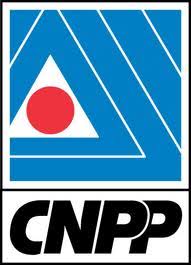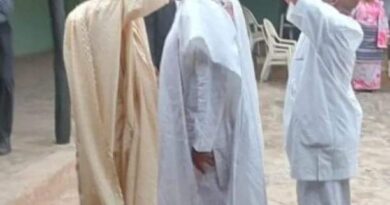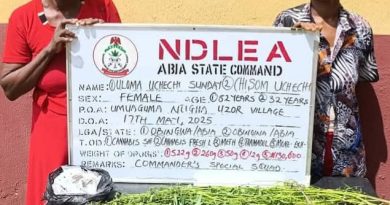Withdrawal Limit: Why Politicians Are Against Cashless Policy Of CBN – CNPP, CSOs… Commend Buhari For Backing CBN
Conference Of Nigeria Political Parties (CNPP) and civil society organisations (CSOs) under the aegis of Coalition Of National Civil Society Organisations (CNCSOs) have given insights into the reasons political office holders are voicing out against the recently revised cash withdrawal limits by the Central Bank of Nigeria (CBN).
The CBN had recently announced a review of the existing cash withdrawal limits in a memo which showed that individuals would be limited to N100,000per week in over-the-counter (OTC), point-of-sale (POS), or automated teller machines (ATM) withdrawals, while corporate bodies or organisations will be limited to N500,000 per week effective from January 9, 2023.
At a press conference in Abuja on Monday, the CNPP and the CSOs led by the Secretary General of the umbrella association of registered political parties and political associations, Chief Willy Ezugwu and the national Secretary of the CNCSOs, Alhaji Ali Abacha, spoke extensively on the reasons why politicians are against the cash withdrawal limits and the benefits of the policy, especially in view of a national war against corruption and vote-buying.
They recalled that “Since the policy was made public, many Nigerians have shared divergent opinions on the development but as civil society organisations, there is need to properly interrogate the policy and draw some lines.”
According to them, it became necessary to properly interrogate the policy in national interest, harping on the need to “go deeper into the entire cash-less policy of the federal government since its inception due to misconceptions and misunderstanding of the recent development.
“For the purpose of insight, by law, Section 2 (b) of the CBN Act clearly mandates the Central Bank of Nigeria to solely “issue legal tender currency in Nigeria.” The CBN regulates the volume of money supply in the economy in order to ensure monetary and price stability in line with Section 2 (a) of the Act.
“Specifically, the Currency Operations Department of the CBN is responsible for currency management through the planning, procurement, distribution, processing, reissue and disposal of banknotes and coins.
“It was in the exercise of its unambiguous legal duties in Section 2 of its establishment Act thatthe CBN in 2012 introduced what is today known as cash-less policy which led to the application of aspects of the policy beginning from January 1, 2012 in Lagos State, which was tagged Cash-less Lagos.
“As specified by the CBN as far back as 2012, the cash-less policy is aimed at placing Nigeria among the best 20 economies in the world before the year 2020. This is a target that was never met. We’re in 20222. Is Nigeria now among the 20 best global economies? But the CBN informed the world that Nigeria would commence the process of changing to a cash-less economy by January 2012 and complete the process in 2020 to be among the best economies.
“So, why are people complaining about the timing of the implementation of the new cash withdrawal limits when the CBN is running behind it own scheduled implementation target?
“Only a mischievous person will be complaining about the timing of the review of the cash withdrawal limits because we should be applauding Mr. Godwin Emefiele as the CBN Governor for daring to move Nigeria’s economy into top 20 best in the world after over seven years of stagnancy.
“First of all, part of the 2012 cashless policy was conceived to reduce the amount of Naira notes and coins (that is cash) used for business, though not to eliminate their usage in line with Nigeria’s vision 20:2020. If so, why should politicians or anybody be complaining about the current reduction in cash withdrawals even when the CBN is two years behind its own target?
“Also, the cash-less policy, among other gains, is to help the Central Bank and commercial banks better manage our economy to ensure that Nigeria’s Monetary Policy works.
“Now, is Nigeria’s monetary policy working? The answer is NO! Why then are we seeing governors, like that of Adamawa State talking against the CBN Governor and his management team who have vowed to speed up the implementation process for full launch of Nigeria’s cashless policy, two years behind schedule of placing Nigeria among the best 20 economies in the world? It is because many of our current leaders don’t mean well for the country.”
Arguing that the full implementation of the cash-less policy of the CBN was eight years behind the planned 2014 deadline, they noted that “the CBN ran the pilot cash-less policy in Lagos State from January 2012 while the policy took effect in states like Rivers, Anambra, Abia, Kano, Ogun and the Federal Capital Territory (FCT) on the 1st of July, 2013.
“The policy was to be fully implemented nationwide on July 1st, 2014. This means that the full implementation for cashless policy was supposed to take place eight years ago. Does it make sense for any politician who mean well for Nigeria to complain about the timing?
“This is not the first time the CBN is introducing cash withdrawal limits. The CBN, in 2013 introduced cash withdrawal limits in the pilot states mentioned earlier. The 2013 policy required a daily total limit of N500,000free cash withdrawals across all accounts for individuals and N3, 000,000 for corporate customers.
“It was at that time that the CBN introduced “alternative cash payments” systems, including Point-of-sale (POS) terminals, Mobile payment systems,Internet banking, Multi-functional Automated Teller Machine (ATM), Electronic Funds Transfer Systems, and Direct debits.
“These were part of the efforts to the CBN to meet its 2020 target for Nigeria to join the top 20 economies in the world.
We laid this foundation to remind us that cash-less policy was not introduced recently and that the implementation has been progressive since 2012 and was supposed to have been fully implemented eight years ago (2014)”, they said.
The CNPP and CSOs added that the recently reviewed cash withdrawal limits by the CBN was due since 2020 in line with the timelines on the full cash-less policy take-off nationwide.
“The critics have argued that there is no network in some villages. Now, to open account in a bank, you need a means of receiving transaction alerts and the most common is through our phone numbers.
“Today, the cheapest cell phone has enough computing power to perform digital bank functions for the poorest of the poor Nigerians. This is because the CBN introduced the USSD code for mobile banking and transactions without using internet.
“Many poor Nigerians cannot afford a smartphone, no doubt, but most Nigerians who opened a bank account have the cheapest phone for transactions.
“Therefore, for us, any politician using the poor citizens as a stumbling block for Nigeria to join the 20 best economies in the world in line with the masterplan for cash-less policy in the country, even when the CBN is eight years behind its 2014 schedule, is not sincere.
“Some of them were planning to buy votes in 2023 or they may be involved in some illegitimate businesses. This is because the CBN policy is only limiting cash withdrawals, not digital transaction limits. But because they don’t want any trace to their transactions, the corrupt political elites want to use the poor as a reason for their agitation to keep Nigeria backward economically”, they said.
On the new naira notes, they observed that “Since the unveiling of the newly redesigned naira notes, we have seen several videos of our mutilated banknotes in trailer loads.
“The naira notes were hoarded by individuals outside the banking system denying banks money to lend to customers for legitimate businesses. That is how they have been killing the economy”, the Coalition and the CNPP lamented.
Carpeting the the House of Representatives for calling for the suspension of the cash withdrawal limits, the CNPP and the CSOs said that the CBN Governor, Godwin Emefiele, and the apex bank’s management team should be applauded rather than victimisation.
According to them, “The height of the display of their ignorance of the progressive implementation of Nigeria’s cash-less policy which took effect in 2012 was the resolution by the House of Representatives last Thursday asking the CBN Governor, Mr. Godwin Emefiele to suspend implementation of the cash withdrawal policy.
“The House of Reps also demanded that Emefiele appearbefore the lower chamber of the National to explain to the House on the impact and significance of the new policy. To show that the lawmakers did not mean well, why call for a suspension of a policy that has not taken effect? The new withdrawal policy is the take effect in February 2023”, they added.
Commending president Muhammadu Buhari for supporting the policy, the CNPP and the civil society coalition said, “We commend President Muhammadu Buhari for standing with the CBN management and for endorsing the ongoing transition from cash-based economy to a cash-less Nigerian society.
“A full cash-less economy will be the best anti-corruption legacy of the President Buhari administration and Nigerians will be mobilised to vehemently resist plots to abort it in coming days”, the CNPP and the CSOs said




